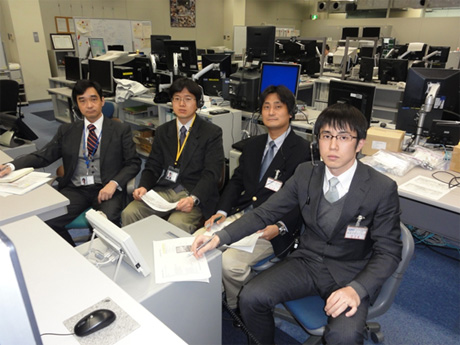This is an archive of information released in the past.
Disclaimer: It may contain broken links or outdated information. Some parts may not function in current web browsers.
*Visit https://humans-in-space.jaxa.jp/en/ for the latest information.

Experiment
- News
- Kibo Utilization Strategy
- Kibo Utilization Plan
- List of JAXA's Utilization Themes
- Experiment Facilities
- Space Environment Utilization
- Archive
Microbe-II Sample Collection Resumes
* All times are Japan Standard Time (JST)
The second sample collection session of the Microbial Dynamics in International Space Station- Part II (Microbe-II)* was resumed.
*Principal Investigator (PI): Koichi Makimura, Associate Professor of Teikyo University Institute of Medical Mycology / Masao Nasu, Professor of Graduate School and School of Pharmaceutical Sciences, Osaka University
Various microbial organisms have been identified in the International Space Station (ISS).
The Microbe experiment tries to identify types of microbes in Kibo by long-term sample collections. The experiment evaluates effects of those microbial organisms on the health of crew members and equipment aboard Kibo, based on unique microbial environment of the ISS, which is characterized by microgravity and confined environment.
The Microbe experiment consists of three flight missions, Microbe-I, II and III. The Microbe-I was performed in August and September, 2009. In the Microbe-II, three sample collection sessions will be performed.
Sample collection was performed in October, and the samples are scheduled to return to the ground in October 2010 by the STS-133 mission. However, the launch of the space shuttle Discovery (STS-133 mission) was postponed, thus the Microbe-II sample collection sessions were temporarily suspended and rescheduled. The rescheduled sample collection sessions will be performed on February 26, 28 and March 1. The samples collected using the culture sheets will be cultured on orbit using the experiment facility in the Kibo module. The cultured samples and other collected samples will be stored in the station's refrigerator/freezer, MELFI, until brought back to the ground aboard Discovery (STS-133).
On the ground, the samples will be analyzed by the Microbe experiment team.
Three sample collection methods were prepared for the experiment. Three types of sample collection kit, including fungi (molds and yeasts) culture sheet, adhesive sheet, and swab (polyester swab), will be used. The fungi culture sheet is designed to culture fungi samples collected from the surface of the equipment on board Kibo. The cultured samples will be documented (photographed) by the crew members and stored in the station's refrigerator/freezer, MELFI, until recovery to the ground.
Special Message from Koichi Makimura (PI) Associate Professor of Teikyo University
We are glad that sample collection sessions of Microbe-II are resumed. Microbe-II will collect microbe samples 1,000 days after the beginning of the Kibo operations. It would show us the status of the microbial environment inside the Kibo module. Seventeen months has been elapsed since the last sample collection sessions of Microbe-I. During the 17 months, ISS crew members have lived and performed various experiments in the Kibo module. How has the microbial environment inside Kibo changed? Would the inside of the Kibo module be the same microbial status? We look forward to results of the sample collections.
Special Message from Masao Nasu (PI) Professor of Osaka University
The Microbe-II sample collection will use an adhesive sheet specially developed for this experiment. The monitoring of the microbial environment inside the Kibo module is attracting attentions from scientists around the world. We will continue Kibo microbial environment monitoring and will actively share the collected data to the world, hoping that our experiment will offer basic information required to study the microbial environment inside future manned spacecrafts.

Microbe-II team members monitoring the sample collection session
performed in Kibo from the UOA (From left, Makimura (PI, Teikyo University),
Yamaguchi (Osaka University), and Ichijyo (Osaka University)
(Photo Credit: JAXA)
*All times are Japan Standard Time (JST)
| Copyright 2007 Japan Aerospace Exploration Agency | Site Policy |